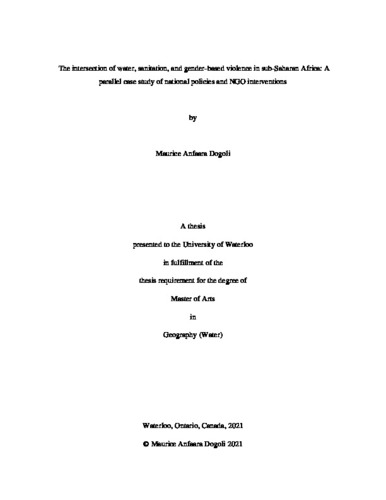| dc.description.abstract | Millions of people globally are without access to safe water, safely managed sanitation, and improved hygiene. Much of the global population who depend on unsafe water, have no access to safely managed sanitation and improved hygiene collectively referred to as WASH reside in sub-Saharan Africa (SSA). Despite coordinated efforts through policies like Millennium Development Goals (MDGs) and Sustainable Development Goals (SDGs) to tackle the challenges of access to WASH, the problems still linger. The challenges of WASH access affect everyone somewhat disproportionately. Women and girls are affected the most because sociocultural norms burden women and girls with water fetching, domestic activities that require water and care for the sick. In striving to perform these societal expectations in the absence of water, women and girls walk long distances to fetch water, exposing them to sexual violence and physical attacks. Additionally, the absence of WASH facilities for women and girls to take care of their needs causes psychological stress among women and girls. On the other hand, when sanitary facilities exist but are not well illuminated, it creates fertile grounds for sexual violence against women by men who lure in the dark. Structural violence also occurs when policies and policymakers fail to adequately tackle the WASH needs of women and girls. Therefore, the purpose of this research is to understand how international and national policies, strategies, and frameworks tackle violence against women and girls in WASH. A focus is also on how WASH NGOs incorporate issues of violence against women and girls in their interventions to increase WASH access. Based on the findings from the above mentioned, innovative strategies to tackle violence are proposed. Key informant interviews were conducted with ten (10) participants from NGOs in Ghana, Kenya, and Uganda. This was followed by a content analysis of selected documents from UN-Water, UNICEF, Ghana, Kenya, and Uganda. The results point to nonexistent policies or laws to protect women and girls from WASH violence. NGOs in the WASH sector deplore tools like Social Analysis and Action, Community Scorecard, education, and dialogue in tackling violence against women and girls in WASH access. This research can inform WASH policymakers to pay greater attention to violence against women and girls in WASH access. Results can also inform cross-country policies to ensure the needs of everyone, especially women and girls, are met in WASH interventions. | en |

